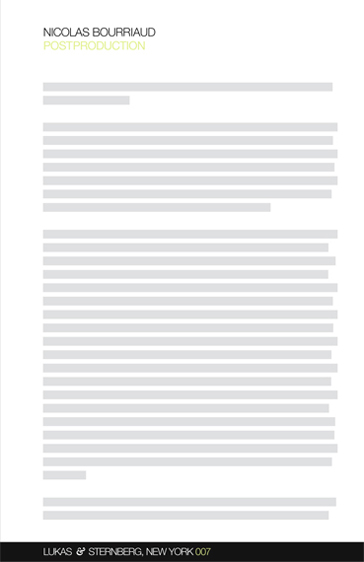Jeffrey Skoller: Shadows, Specters, Shards. Making History in Avant-Garde Film (2005)
Filed under book | Tags: · 1970s, 1980s, 1990s, avant-garde, cinema, experimental film, film, film history, film theory

Demonstrates how avant-garde films better reflect the complexity of history than conventional film.
Avant-garde films are often dismissed as obscure or disconnected from the realities of social and political history. Jeffrey Skoller challenges this myth, arguing that avant-garde films more accurately display the complex interplay between past events and our experience of the present than conventional documentaries and historical films.
Shadows, Specters, Shards examines a group of experimental films, including work by Eleanor Antin, Ernie Gehr, and Jean-Luc Godard, that take up historical events such as the Holocaust, Latin American independence struggles, and urban politics. Identifying a cinema of evocation rather than representation, these films call attention to the unrepresentable aspects of history that profoundly impact the experience of everyday life. Making use of the critical theories of Walter Benjamin and Gilles Deleuze, among others, Skoller analyzes various narrative strategies—allegory, sideshadowing, testimony, and multiple temporalities—that uncover competing perspectives and gaps in historical knowledge often ignored in conventional film. In his discussion of avant-garde film of the 1970s, 1980s, and 1990s, Skoller reveals how a nuanced understanding of the past is inextricably linked to the artistry of image making and storytelling.
Publisher University of Minnesota Press, 2005
ISBN 081664232X, 9780816642328
233 pages
PDF (updated on 2012-7-14)
Comment (0)Dona Kolar-Panov: Video, War and the Diasporic Imagination (1997)
Filed under book | Tags: · 1990s, australia, migration, video, war, yugoslavia

Video, War and the Diasporic Imagination is an incisive study of the loss and (re)construction of collective and personal identities in ethnic migrant communities. Focusing on the Macedonian and Croatian communities in Western Australia, Dona Kolar-Panov documents the social and cultural changes that affected these diasporic groups on the fragmentation of Yugoslavia. She vividly describes the migrant audience’s daily emcounter with the media images of destruction and atrocities committed in Croatia and Bosnia, and charts the implications the continuous viewing of the real and excessive violence had on the awakening of their ethno-national consciousness.
Publisher Routledge, 1997
ISBN 0415148804, 9780415148801
270 pages
Keywords and phrases
Serbian, Western Australia, Stjepan Radic, Serbs, SFRJ, Perth, SBS-TV, Vukovar, semiosphere, Republic of Macedonia, Zagreb, Opuzen, satellite television, Skopje, video tapes, Sibenik, Aegean Macedonia, folk music, Croatian diaspora, intertitle
More info (publisher)
More info (google books)
Nicolas Bourriaud: Postproduction: Culture as Screenplay: How Art Reprograms the World (2002–) [EN, ES, CZ, HU, RO, BR-PT]
Filed under book | Tags: · 1990s, aesthetics, art history, art theory, contemporary art

“In this book, French writer and curator Nicolas Bourriaud discusses how, since the early nineties, an ever increasing number of artworks have been created on the basis of preexisting works; more and more artists interpret, reproduce, re-exhibit, or use works made by others or available cultural products.
This art of postproduction seems to respond to the proliferating chaos of global culture in the information age, which is characterized by an increase in the supply of works and the art world’s annexation of forms ignored or disdained until now.”
First published in French in 2002.
Translated by Jeanine Herman
Publisher Lukas & Sternberg, New York, 2002
Second edition, with a new preface, August 2005
ISBN 0974568899
96 pages
Review: Hal Foster (London Review of Books, 2003).
Publisher (EN)
Postproduction (English, trans. Jeanine Herman, 2005, updated on 2023-7-21)
Postproducción (Spanish, trans. Silvio Mattoni, 2004, added on 2023-7-21)
Postprodukce (Czech, trans. Petr Turek, 2004, added on 2014-2-25)
Utómunkálatok (Hungarian, trans. Jancsó Júlia, 2007, 55 MB, no OCR, updated on 2023-7-21)
Postproducţie (Romanian, trans. Cristian Nae, 2007, 56 MB, added on 2024-2-20)
Postprodukce (BR-Portuguese, trans. Denise Bottmann, 2009, added on 2024-2-20)

